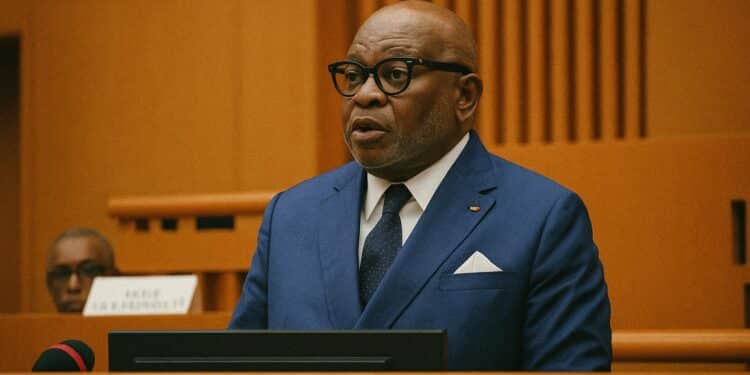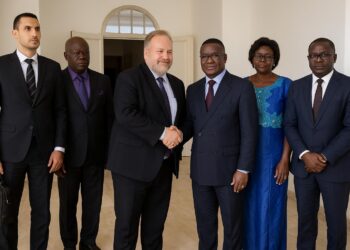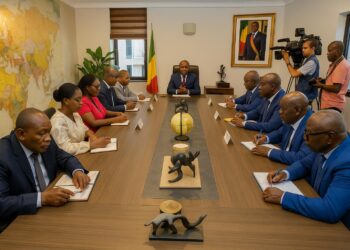Parliamentary Spotlight on an Uncomfortable Shortage
The rare tension that flickered in the National Assembly on 4 July revealed the unease created by several months of intermittent fuel queues in Brazzaville, Pointe-Noire and the corridor towns in-between. Questioned by lawmakers, Hydrocarbons Minister Bruno Jean Richard Itoua refused to cloak the difficulty: domestic demand has outpaced the combined output of the Congolaise de raffinage, better known as Coraf, and the traditional import circuit. He reminded deputies that Coraf can satisfy barely sixty percent of national needs, a figure broadly corroborated by the latest OPEC downstream assessment (OPEC Monthly Report, May 2023). The minister’s candid tone was nevertheless coupled with a pledge that the executive, acting under the guidance of President Denis Sassou Nguesso, would neutralise the bottleneck without placing an undue burden on households.
Emergency Logistics and the Mathematics of Autonomy
At the operational level, the Société nationale des pétroles du Congo has converted the crisis into what insiders describe as a ‘logistics surge’. A revised import calendar brings in sequential cargoes that, once blended with Coraf’s throughput, translate into 105 days of gasoline cover and 70 days of diesel autonomy for the July-August window. Two tankers have already discharged at the export terminal while a third is expected before 10 July, restoring a semblance of equilibrium to retail stations in the southern provinces. Senior SNPC managers argue that the stock-build is not merely a band-aid; it also tests the responsiveness of port handling, inland haulage and fiscal clearance—systems that will be indispensable when Pointe-Noire’s container terminal scales up later this year (Africanews, June 2023).
Structural Vision: Pipelines, Depots and a New Economic Model
Beyond the immediate uplift, Brazzaville’s strategy pivots on infrastructure that will insulate the landlocked centre from Atlantic turbulence. The planned 610-kilometre pipeline linking Pointe-Noire to the capital, conceived under a cooperation agreement with the Russian Federation, is the flagship. Once operational, three depots with a combined capacity of 300 000 m³—triple the storage currently controlled by Sclog—should compress transport costs and stabilise inland wholesale prices. Complementary measures include the rehabilitation of key sidings on the Chemin de Fer Congo-Océan, thereby easing the pressure on road tankers and reducing carbon leakage consistent with the country’s Nationally Determined Contribution under the Paris Agreement (UNFCCC submission, 2021).
The minister also unveiled work on a forward-looking ‘economic cockpit’ for the downstream segment. This model, prepared with guidance from specialised consultancies and multilateral partners, would map margins across refining, marketing and distribution to ensure cost reflectivity without compromising fiscal discipline. According to a senior official involved in the drafting process, the blueprint mirrors benchmarking exercises undertaken in Côte d’Ivoire and Ghana, where granular data have sharpened regulatory oversight (Reuters, March 2023).
Pricing Orthodoxy versus Social Stability
Any discussion of fuel security in Congo-Brazzaville inevitably brushes against the sensitive question of retail pricing. A 2022 technical mission by the International Monetary Fund recommended full liberalisation as the most durable route to eliminating the structural deficit that gnaws at the treasury (IMF Technical Assistance Report, 2022). However, the executive has so far treated that prescription with measured caution. Minister Itoua was explicit before the Assembly: price deregulation would, in the short term, constrict access for vulnerable citizens—a scenario the government considers politically and socially untenable.
Instead, a tri-layered approach is emerging. First, the treasury is exploring hedging instruments to cushion import bills when Brent surges. Second, the Ministry of Social Affairs is calibrating a limited, targeted subsidy for public transport cooperatives, thus preventing an inflationary spiral in commuter fares. Third, the Hydrocarbons portfolio is negotiating performance contracts with service-station operators to curb illicit reselling and artificial shortages. Industry sources indicate that compliance clauses may soon be tethered to digital metering, an innovation already piloted in neighbouring Gabon.
Regional Diplomacy and the Path toward Resilience
The fuel episode has also propelled Brazzaville into a more assertive regional energy diplomacy. Talks are underway with Angola’s Sonangol for reciprocal use of storage flexibilities, an arrangement that could grant Congo access to Luanda’s surplus cargoes during maintenance shutdowns at Coraf. Simultaneously, the Economic and Monetary Community of Central Africa is studying a pooled strategic reserve, an idea floated by President Sassou Nguesso at the April heads-of-state retreat in Yaoundé.
While these schemes remain embryonic, they signal a recognition that supply security transcends national frontiers. For international observers, the real test will be whether the reforms outlined in the Assembly solidify into enforceable timelines and funded budgets. Investors from Asia and the Middle East, already active in Congo’s upstream blocks, have privately welcomed the clarity of the downstream roadmap; diplomats, for their part, are keen to see how Brazzaville balances fiscal prudence with its longstanding commitment to social equilibrium.
Yet even critics concede that the government’s present course—combining swift logistics, structural investment and calibrated pricing—marks a coherent response to an inherently complex challenge. If the pipeline breaks ground on schedule and the economic cockpit delivers transparent metrics, Congo-Brazzaville could emerge with a downstream sector more resilient than at any point since the early 1990s. In the geopolitical marketplace of hydrocarbons, that would be no minor achievement.











































